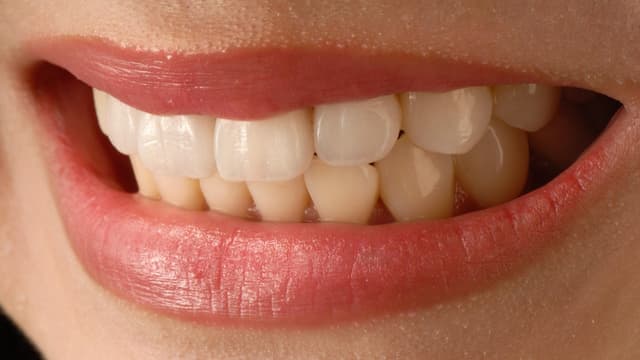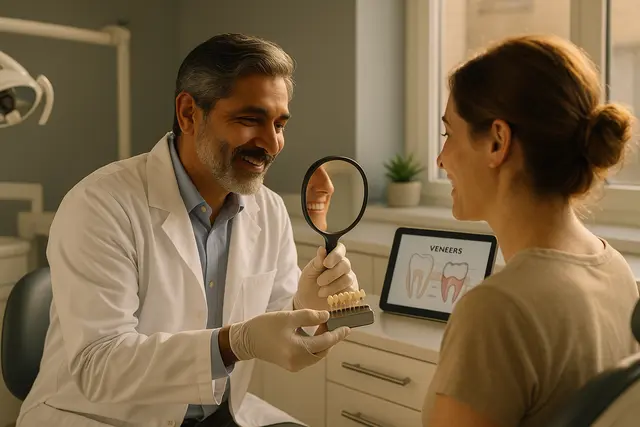Cosmetic Dentistry
4 min read
Mar 19, 2025
Are Veneers Reversible? What Happens If You Remove Them
If you’ve been eyeing a brighter, straighter smile and stumbled into the world of veneers, you’re not alone. Veneers are one of the most popular cosmetic dental procedures today. But with popularity comes curiosity, and a lot of questions. One of the biggest: Are veneers reversible? And what exactly happens if you want to remove them later on?

Veneer Basics: What Are We Talking About Here?
A veneer is a thin shell, usually made from porcelain or composite resin, that your dentist bonds to the front surface of a tooth. Veneers are a cosmetic solution, often used to fix discoloration, chips, small gaps between teeth, or to enhance your smile when whitening and bonding just don’t cut it.
There are different types of veneers you can choose from. Traditional porcelain veneers offer durability, natural-looking aesthetics, and resistance to stains. Composite veneers, made from a tooth-colored resin, are more budget-friendly and can be done in one visit. Both have their perks, and the type of veneers you choose can impact whether your veneers are reversible.
The Reversibility Question
Here’s the heart of it: Are veneers reversible?
The short answer? Not usually. Once you get traditional veneers, they’re considered permanent. That’s because during the veneers procedure, your dentist will remove a small amount of enamel, usually just a thin layer, to help the veneer bond properly and fit naturally. Enamel cannot regenerate, so once it’s gone, it’s gone.
Because of that enamel removal, veneers are one of those cosmetic dental procedures that require a long-term commitment. Even if you decide you’re unhappy with the appearance of your veneers later on, you can’t go back to your natural teeth. They’ll need to be replaced with new veneers or a different restoration, like a dental crown.
Porcelain Veneers: Durable, Stunning, Not Reversible
Porcelain veneers are incredibly popular for a reason. They mimic the light-reflecting qualities of natural teeth and are tough against stains from your morning coffee or evening glass of red wine. Porcelain veneers require that layer of enamel to be filed down, though, which makes them a permanent change.
So are porcelain veneers reversible? No, not in the traditional sense. If they fall off or if you remove them, you’ll likely need new ones or a different solution to protect the exposed underlying tooth structure. The bright side? Porcelain veneers last a long time, often up to 15 years with proper care.
When Veneers May Be Reversible
Here’s where it gets a bit more optimistic. Some composite veneers or temporary veneers may be applied without preparing your teeth, meaning the enamel stays untouched. These are often called “removable veneers” or “no-prep” veneers.
In these cases, if you want to remove them, you can, because your natural teeth are still intact underneath. This is one of the reasons some patients who are just testing the cosmetic dentistry waters choose composite over porcelain.
But there’s a tradeoff. Composite resin isn’t as strong or stain-resistant as porcelain, and removable veneers won’t last as long. They also may not look quite as natural, depending on the design and your smile goals.
Cosmetic Dentist Know-How: Why It Matters
A big piece of the puzzle? Your cosmetic dentist. A skilled cosmetic dentist will walk you through your options, explain whether the veneers procedure requires enamel removal, and let you know whether your veneers are permanent or reversible. This kind of clear communication matters, especially when you’re making a change to your teeth that affects your long-term dental care.
If you’re considering veneers, ask your dental team about different types of veneers, including traditional porcelain veneers, composite veneers, and no-prep options. Ask how much enamel will be removed, whether you’ll be able to whiten your surrounding teeth later, and how the veneers will match the color of your natural teeth.
The Underlying Tooth Story
Once a veneer is bonded, it’s protecting the front surface of your tooth, but if that veneer chips, cracks, or needs to be replaced, your underlying tooth structure will need a new veneer or a dental crown to remain functional and protected.
This is why proper care matters. Veneers may be strong, but they’re not indestructible. Avoid biting on ice, opening packages with your teeth (seriously, don’t do this), and make sure to visit your dentist regularly. With good dental care, veneers can last as long as 10 to 15 years, sometimes even longer.
Beyond Veneers: Are There Alternatives?
If you’re not ready to commit to a permanent change, or the idea of enamel removal gives you the chills, don’t worry. There are alternatives to veneers worth considering.
Cosmetic dental options like dental bonding, teeth whitening, and orthodontic treatments (including invisible aligners) can help improve the appearance of your smile without reshaping your teeth. Dental bonding does not usually require any enamel removal and can be a great fix for chips or discoloration, especially if you’re looking for a short-term or less costly solution.
Keep in mind, though, that bonding doesn’t last as long and can stain more easily than veneers.
Making the Call: What’s Right for You?
Veneers are one of those dental procedures that really need to fit your goals and lifestyle. If you’re looking to improve your smile and are okay with a long-term commitment, porcelain veneers can work wonders. If you want something less permanent, choose composite or removable veneers to see how you feel first.
Either way, talk with a dentist who specializes in cosmetic dentistry. Ask questions, weigh the pros and cons, and make an informed decision. Your smile is personal. Whether you’re looking for a full smile makeover or just want to tweak the appearance of your teeth, there’s a path forward that fits you.
Because while veneers are thin, your decision shouldn’t be.
Are Veneers Reversible or Permanent?
Traditional veneers, especially porcelain ones, are considered permanent because they require removal of enamel, which doesn’t grow back. Once placed, you’ll always need some form of coverage, either another veneer or a crown, to protect the tooth underneath.
What’s the Difference Between Porcelain and Composite Veneers?
Porcelain veneers are more durable, stain-resistant, and natural-looking, but require more tooth preparation and cost more. Composite veneers are more affordable, can often be applied in one visit, and may be reversible if no enamel is removed, though they don’t last as long.
Are There Any Veneer Options That Don’t Involve Enamel Removal?
Yes, no-prep or removable veneers, usually made of composite resin, may not require enamel removal. These are less invasive and reversible, but they’re not as durable or natural-looking as traditional porcelain veneers.
What Are Some Alternatives to Veneers for Cosmetic Tooth Fixes?
If you’re not ready for veneers, dental bonding, teeth whitening, or clear aligners can improve your smile with less commitment. Bonding is ideal for chips and discoloration and usually doesn’t require enamel removal, though it may stain and wear down faster than veneers.
Read Next
Related Posts

Cosmetic Dentistry
Looking for a Dentist Who Whitens Teeth? Here’s What to Know First
A brighter smile can do wonders for your confidence, but finding the right dentist who whitens teeth takes more than just a quick Google search. From treatment options to experience and safety measures, there are a few key things you should know before booking that whitening appointment.
3 min read
Sep 10, 2025

Cosmetic Dentistry
What Type of Dentist Does Veneers? Here’s Who to Trust With Your Teeth
Dreaming of a flawless, photo-ready smile? Veneers can be a game-changer, but only if you choose the right expert to apply them. Understanding who’s qualified to handle this cosmetic procedure is key to getting results that look natural and last for years.
5 min read
Sep 08, 2025

Cosmetic Dentistry
Cosmetic Dentistry and Implants: How They Work Together
A confident smile can do wonders for your self-esteem, and modern dentistry offers more ways than ever to achieve it. Whether you're dealing with missing teeth or simply want a brighter, more balanced look, cosmetic dentistry and dental implants provide powerful solutions that work hand-in-hand to restore both function and aesthetics.
5 min read
Sep 05, 2025
Don’t have time to research every dentist around you?
See why 30k+ patients trusted us